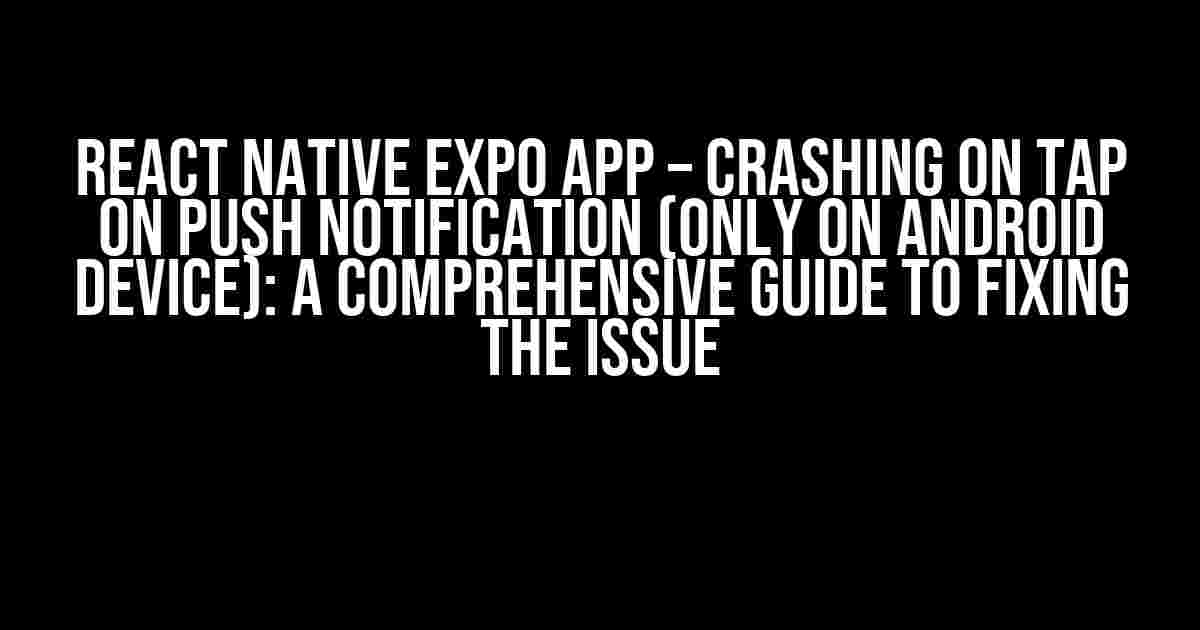Ah, the joys of building a React Native Expo app! It’s all sunshine and rainbows until your app starts crashing on tap on push notification, and only on Android devices, at that. Don’t worry, friend, you’re not alone in this struggle. In this article, we’ll dive into the depths of this issue, explore its causes, and provide a step-by-step guide to fixing it. So, buckle up and let’s get started!
Understanding the Issue
Causes of the Issue
There are a few reasons why your React Native Expo app might be crashing on tap on push notification on Android devices. Here are some common culprits:
- Incorrectly configured AndroidManifest.xml file: A misconfigured AndroidManifest.xml file can cause the app to crash when handling notification clicks.
- Missing or incorrect notification channel configuration: Failing to configure notification channels correctly can lead to app crashes on Android devices.
- Incompatible Expo SDK version: Using an outdated or incompatible Expo SDK version can cause issues with notification handling on Android devices.
- Conflicting dependencies or plugins: Sometimes, conflicting dependencies or plugins can cause the app to crash when handling notification clicks.
Fixing the Issue
Now that we’ve covered the causes, let’s move on to the solutions. Follow these steps to fix the issue and get your app running smoothly:
Step 1: Update Expo SDK to the Latest Version
Make sure you’re using the latest version of the Expo SDK. Run the following command in your terminal:
expo upgradeThis will ensure you have the latest version of the Expo SDK and its dependencies.
Step 2: Configure AndroidManifest.xml File
Open your `AndroidManifest.xml` file and add the following code:
<receiver android:name="com.google.firebase.messaging.DefaultFirebaseMessagingService"
android:enabled="true"
android:exported="true">
<intent-filter>
<action android:name="com.google.firebase.MESSAGING_EVENT" />
</intent-filter>
</receiver>This code configures the Firebase Messaging Service to handle notification clicks correctly.
Step 3: Configure Notification Channels
Create a new file called `notification.js` in your project’s root directory and add the following code:
import { Notifications } from 'expo';
const createNotificationChannel = async () => {
const channel = new Notifications.Android.Channel('default', 'Default Channel', 'This is the default channel');
await Notifications.android().createChannel(channel);
};
createNotificationChannel();
This code creates a default notification channel for your app. Make sure to call the `createNotificationChannel` function when your app initializes.
Step 4: Handle Notification Clicks Correctly
In your app’s `App.js` file, add the following code:
import { Notifications } from 'expo';
const handleNotificationClick = (notification) => {
// Handle notification click logic here
};
Notifications.addNotificationReceivedListener((notification) => {
handleNotificationClick(notification);
});
This code sets up a listener to handle notification clicks. When a notification is clicked, the `handleNotificationClick` function will be called.
Step 5: Test Your App
Build and run your app on an Android device. Send a push notification to your app and tap on it. If everything is configured correctly, your app should open and navigate to the specified screen.
Troubleshooting Tips
If you’re still experiencing issues, here are some troubleshooting tips to help you identify and fix the problem:
- Check AndroidManifest.xml file configuration: Double-check that your `AndroidManifest.xml` file is configured correctly and that the Firebase Messaging Service is enabled.
- Verify notification channel configuration: Ensure that your notification channels are configured correctly and that you’re using the correct channel ID when sending notifications.
- Check Expo SDK version compatibility: Make sure you’re using a compatible Expo SDK version with your React Native version.
- Review dependencies and plugins: Review your dependencies and plugins to ensure there are no conflicts that could be causing the issue.
Conclusion
Fixin’ app crashes on tap on push notification on Android devices can be a real pain, but with these steps, you should be able to identify and fix the issue. Remember to keep your Expo SDK version up to date, configure your `AndroidManifest.xml` file correctly, set up notification channels, and handle notification clicks correctly. If you’re still stuck, try troubleshooting with the tips provided above. Happy coding!
| Common Errors | Solutions |
|---|---|
| App crashes on tap on push notification | Update Expo SDK, configure AndroidManifest.xml file, set up notification channels, and handle notification clicks correctly |
| Notification clicks not handled correctly | |
| Notification channels not configured correctly | Create a default notification channel and configure it in the notification.js file |
Frequently Asked Question
Having trouble with your React Native Expo app crashing on tap of push notifications, only on Android devices? Don’t worry, we’ve got you covered! Check out these FAQs to troubleshoot the issue.
Q1: Is this issue specific to Expo SDK version?
Yes, this issue is often related to specific Expo SDK versions. Make sure you’re running the latest Expo SDK version. If you’re still experiencing issues, try downgrading to a previous version or checking the Expo changelog for any known bugs.
Q2: Could this be a problem with my AndroidManifest.xml file?
Possibly! Check your AndroidManifest.xml file to ensure that the intent-filter for the push notification is correctly configured. Also, verify that the android:launchMode is set to “singleTask” for the activity that receives the push notification.
Q3: Is there a possibility that the issue is related to the notification payload?
Yes, that’s possible! Check the notification payload to ensure it’s correctly formatted and doesn’t contain any malformed data. Also, verify that the notification payload is handled correctly in your app’s notification handler.
Q4: Could this be a problem with my app’s JavaScript code?
It’s possible! Check your app’s JavaScript code for any syntax errors or execution errors that might be causing the crash. Use debugging tools like React Native Debugger or console logs to identify the issue.
Q5: Are there any known workarounds for this issue?
Yes, as a temporary workaround, you can try disabling the Push Notification feature on Android devices or use a third-party push notification library. However, it’s recommended to investigate and fix the root cause of the issue for a more permanent solution.

